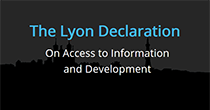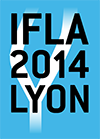
80th IFLA General Conference and Assembly
16-22 August 2014, Lyon, France
18 August 2014
What is the Post 2015 Development Agenda?
Español | Deutsch | Русский | français | العربية | 简体中文
 Background
Background
The United Nations is presently reviewing the Millennium Development Goals (MDGs) so that it can prepare a new development framework for the post-2015 period. The framework will guide developed and developing countries in improving living conditions for their people.
UN Member State negotiations start in September 2014. The negotiations will proceed during the period September 2014 – September 2015 and will lead to an agreement on a new framework to be implemented from January 1st 2016.
The post-2015 dialogue is seen as an opportunity to develop a practical agenda to ensure the principle ‘leaving no one behind’ translates into real changes to deliver essential services to those in poverty.
Libraries and the Post 2015 Development Agenda
As the United Nations reflects on the future of global development and the post-2015 agenda, access to information must be recognised as critical to supporting governments to achieve development goals, and enabling citizens to make informed decisions to improve their own lives. IFLA believes that high-quality library and information services help guarantee that access.
Libraries and access to information:
- Enable governments and civil society to achieve development goals: Libraries are transparent, accountable institutions that support government programmes and provide services that help government, civil society and business to better understand citizens’ information needs;
- Support citizens to make informed decisions: Libraries provide equitable access to information, and expert guidance to effectively use the world’s knowledge. Librarians contribute to the reduction of poverty, exclusion and inequality by helping citizens develop skills to effectively seek, access, and use information in all forms.
It is essential that libraries are able to play a contributing role in the post-2015 development agenda. By including libraries in development policies, governments and development organisations can draw upon community-based information resources and expertise that could mean the difference between a successful project and a failed one. IFLA encourages all library associations, institutions and librarians to demonstrate the contribution that access to information and libraries make to achieving development as outlined in the IFLA Statement on Libraries and Development by:
- Advocating for, and delivering, library and information services relevant to a library’s local environment that help citizens to be educated, informed and included;
- Monitoring and contributing to the post-2015 agenda utilising briefings and support materials to be provided by IFLA, and;
- Supporting national and local frameworks that achieve development goals and help governments to understand citizens’ information needs.
The Lyon Declaration underpins these principles.
Last update: 18 August 2014


